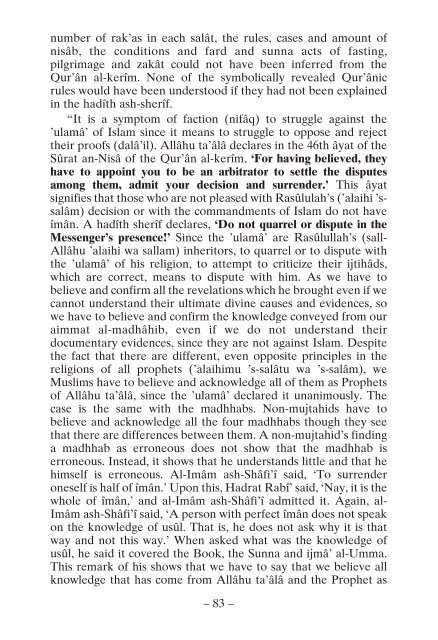Answer to an Enemy of Islam
Answer to an Enemy of Islam This is a refutation of the lies and slanders which the lâ-madhhabî Rashîd Rıdâ of Egypt, who appeared in the disguise of a religious man and wrote against the scholars of Islam in his book Muhâwarât.
Answer to an Enemy of Islam
This is a refutation of the lies and slanders which the lâ-madhhabî Rashîd Rıdâ of Egypt, who appeared in the disguise of a religious man and wrote against the scholars of Islam in his book Muhâwarât.
Create successful ePaper yourself
Turn your PDF publications into a flip-book with our unique Google optimized e-Paper software.
number <strong>of</strong> rak’as in each salât, the rules, cases <strong>an</strong>d amount <strong>of</strong><br />
nisâb, the conditions <strong>an</strong>d fard <strong>an</strong>d sunna acts <strong>of</strong> fasting,<br />
pilgrimage <strong>an</strong>d zakât could not have been inferred from the<br />
Qur’ân al-kerîm. None <strong>of</strong> the symbolically revealed Qur’ânic<br />
rules would have been unders<strong>to</strong>od if they had not been explained<br />
in the hadîth ash-sherîf.<br />
“It is a symp<strong>to</strong>m <strong>of</strong> faction (nifâq) <strong>to</strong> struggle against the<br />
’ulamâ’ <strong>of</strong> <strong>Islam</strong> since it me<strong>an</strong>s <strong>to</strong> struggle <strong>to</strong> oppose <strong>an</strong>d reject<br />
their pro<strong>of</strong>s (dalâ’il). Allâhu ta’âlâ declares in the 46th âyat <strong>of</strong> the<br />
Sûrat <strong>an</strong>-Nisâ <strong>of</strong> the Qur’ân al-kerîm, ‘For having believed, they<br />
have <strong>to</strong> appoint you <strong>to</strong> be <strong>an</strong> arbitra<strong>to</strong>r <strong>to</strong> settle the disputes<br />
among them, admit your decision <strong>an</strong>d surrender.’ This âyat<br />
signifies that those who are not pleased with Rasûlulah’s (’alaihi ’ssalâm)<br />
decision or with the comm<strong>an</strong>dments <strong>of</strong> <strong>Islam</strong> do not have<br />
îmân. A hadîth sherîf declares, ‘Do not quarrel or dispute in the<br />
Messenger’s presence!’ Since the ’ulamâ’ are Rasûlullah’s (sall-<br />
Allâhu ’alaihi wa sallam) inheri<strong>to</strong>rs, <strong>to</strong> quarrel or <strong>to</strong> dispute with<br />
the ’ulamâ’ <strong>of</strong> his religion, <strong>to</strong> attempt <strong>to</strong> criticize their ijtihâds,<br />
which are correct, me<strong>an</strong>s <strong>to</strong> dispute with him. As we have <strong>to</strong><br />
believe <strong>an</strong>d confirm all the revelations which he brought even if we<br />
c<strong>an</strong>not underst<strong>an</strong>d their ultimate divine causes <strong>an</strong>d evidences, so<br />
we have <strong>to</strong> believe <strong>an</strong>d confirm the knowledge conveyed from our<br />
aimmat al-madhâhib, even if we do not underst<strong>an</strong>d their<br />
documentary evidences, since they are not against <strong>Islam</strong>. Despite<br />
the fact that there are different, even opposite principles in the<br />
religions <strong>of</strong> all prophets (’alaihimu ’s-salâtu wa ’s-salâm), we<br />
Muslims have <strong>to</strong> believe <strong>an</strong>d acknowledge all <strong>of</strong> them as Prophets<br />
<strong>of</strong> Allâhu ta’âlâ, since the ’ulamâ’ declared it un<strong>an</strong>imously. The<br />
case is the same with the madhhabs. Non-mujtahids have <strong>to</strong><br />
believe <strong>an</strong>d acknowledge all the four madhhabs though they see<br />
that there are differences between them. A non-mujtahid’s finding<br />
a madhhab as erroneous does not show that the madhhab is<br />
erroneous. Instead, it shows that he underst<strong>an</strong>ds little <strong>an</strong>d that he<br />
himself is erroneous. Al-Imâm ash-Shâfi’î said, ‘To surrender<br />
oneself is half <strong>of</strong> îmân.’ Upon this, Hadrat Rabî’ said, ‘Nay, it is the<br />
whole <strong>of</strong> îmân,’ <strong>an</strong>d al-Imâm ash-Shâfi’î admitted it. Again, al-<br />
Imâm ash-Shâfi’î said, ‘A person with perfect îmân does not speak<br />
on the knowledge <strong>of</strong> usûl. That is, he does not ask why it is that<br />
way <strong>an</strong>d not this way.’ When asked what was the knowledge <strong>of</strong><br />
usûl, he said it covered the Book, the Sunna <strong>an</strong>d ijmâ’ al-Umma.<br />
This remark <strong>of</strong> his shows that we have <strong>to</strong> say that we believe all<br />
knowledge that has come from Allâhu ta’âlâ <strong>an</strong>d the Prophet as<br />
– 83 –

















